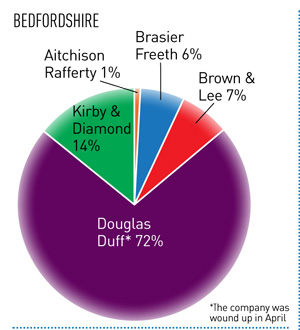A single word unites agents across Bedfordshire, Hertfordshire and Essex. And the word is tough. It is used universally to describe a market that has seen deals take increasingly longer to complete and the volume of space transacted fall to uncomfortably low levels (see pie charts below).
Working longer hours for lower returns is a common refrain from many agents who admit that, whereas once they used to be selective about the type of work they took on, now they are happy to take on almost any instruction simply to generate some fee income.
Commercial agency has taken one of the biggest hits in the recession. Although a large amount of secondhand stock is on most players’ books, much of it will struggle to find an occupier in its current condition, although landlords are keen to do deals to avoid empty rates.
However, that also means low fee income. Steve Ayers, partner at Southend-on-Sea based firm Ayers & Cruiks, explains: “Empty business rates are really biting, and so landlords are very keen to do deals.”
However, low rents and short leases mean that fee income is low and the cut throat nature of price competition is making it even more difficult to sign tenants on buildings where landlords insist on holding out for a specific rent. For industrial space from the Thames Estuary in Thurrock across to the A1 near Dunstable, similar tales are told of properties signing for £1 per sq ft or less.
“Large agency deals are what’s missing at the moment,” says Mike Phoenix, partner at Stevenage-based surveyor Brown & Lee. “The trick is to be able to take on a wide variety of other work, for example, property management and building surveying.”
Redeploying staff, from one office to another, or from one discipline to a completely new one, has become commonplace. Essex surveying firm Glenny’s decision to move a surveyor from outside the county to focus purely on investment work is typical of the internal restructuring now taking place. “When the market changes, you have to adapt to it,” says Glenny’s managing partner John Bell.
Colin Herman, agency director at competing firm Kemsley, agrees. He says regional firms are surviving by becoming true general practitioners. “You can no longer have an agent who specialises in one sector,” he says, “you have to become a master of all trades. And the reality is that experienced people are doing more with less assistance.”
The job culls appear to be over – for now. And some regional firms such as Ayers & Cruiks and Brasier Freeth are even taking on staff.
At least they do not have to worry about London agents muscling in on their patch. “They’ve really pulled back,” says Peter Brown, partner at Brasier Freeth. Many London surveyors, such as Savills’ director Simon Glenn, say they expect to spend little time in the northern M25 counties as they will be focusing on the livelier office market in the M4 corridor.
Normally a chipper bunch, even at the gloomiest of times, agents are uncharacteristically struggling to find positive things to say about the short-term outlook. Gone is the brave talk of a significant recovery being just over a year away. Predictions of 2014 is offered more in hope than conviction as a time that the cycle may move up a gear. There seems to be a broad acceptance that the next couple of years are going to be, well, tough.
Diamond geezer – Andrew Clarke
This year has been a bit of a rollercoaster for head of Kirkby & Diamond’s Bedford office Andrew Clarke. He was crowned Bedfordshire’s most active dealmaker 2011 by EGi, an accolade he picked up as a director of his then-employer, Douglas Duff. But in April came the unexpected news that the company was to be wound up.
“It was a shock,” admits Clarke, “and it felt like it would be easier to go and sit in a dark room. But then I thought, why waste 23 years as a commercial agent, so I picked myself up and carried on.”
Douglas Duff’s loss was rival firm Kirkby & Diamond’s gain. Although it already had an office in Bedford, as well as one in neighbouring Milton Keynes in Buckinghamshire, according to managing partner Andrew Wright, it had long harboured ambitions for a seat in the county town.
“Douglas Duff had a virtual monopoly there. So when the opportunity came, we jumped at the chance to complete the Luton-Milton Keynes-Bedford triangle.”
As April turned into May, Clarke made a virtually seamless transition from one firm to the other, and says most of his clients have come with him.
Local agents view Douglas Duff’s sudden demise, triggered by damages relating to a professional indemnity claim, sympathetically. “It could happen anywhere, and other businesses may well face similar issues,” reflects Wright.











